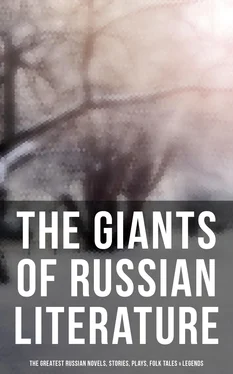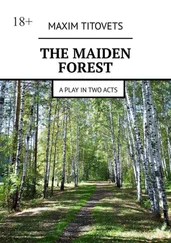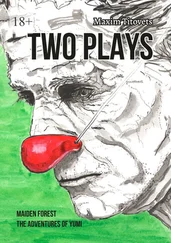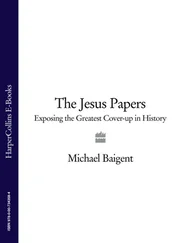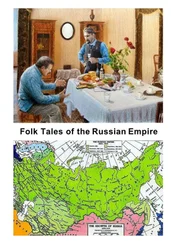The Christian Emperor and the pagan Prince called upon their respective deities to witness the solemn pact between them, and Oleg, having hung his shield in triumph on the gate of the Tzargrad, returned to Kiev loaded with presents and covered with the glory of a successful campaign. Five years later the great Varangian, loved and honoured by his people, feared and respected by his foes, finished his long reign of three-and-thirty years. Tradition has it that the soothsayers foretold that his death should be caused by his favourite horse, whereupon he had it led away and never rode it more. Years after, learning that it was dead, he went to see the skeleton, and placing his foot upon the skull, taunted the warlocks with their miscarried prophecy, whereupon a snake wriggled out and inflicted a bite, of which he died. The same legend crops up in the folk-lore of many lands.
In venturing to compare Oleg with Charles the Great, whose life-work lay in somewhat similar lines, it may be noted of the former that his results were obtained with comparatively little bloodshed, and that he strengthened the position of the dynasty while forming the empire over which it was to rule. The fairest and most fertile districts of Russia were added to the principality during his regency, and, more important still, the peoples whom he subjugated were permanently welded into the confederation. The Slavs of Kiev in the later years of Oleg were essentially the “men” of the Russian State, a rapidity of assimilation which was scarcely observable in the case of the Bavarians and Frisians of the Frankish Empire, or the Saxons of Norman England. In the matter of religion, too, the heathen Prince contrasts favourably with the great Christian Emperor, and though the worshipper of the Christ who “came not to send peace but a sword” into the world may have butchered his nonconforming subjects with the honestest conviction of well-doing, it is pleasanter to read of the toleration which the follower of Peroun extended to the Christian communities within his realm.
912
Igor, who after a long minority succeeded to a more extensive and firmly established principality than his father had bequeathed him, was occupied at the commencement of his reign in suppressing a revolt of the Drevlians and Ulitches, the least well affected of the Slav tribes subject to his rule, who had refused payment of the yearly tribute. The gathering-in of this impost was entrusted to Svenald, a Varangian to whom Igor deputed the internal management of the realm; after a three-years’ struggle the rebels were mastered and the amount of their tribute increased. A new source of uneasiness arose at this juncture from the arrival in South Russia of the Petchenigs, a Finn-Turko tribe who migrated from the plains of Asia in the wake of the Magyars and settled in the steppe-land on either side of the Dniepr. The city of Kiev enjoyed an immunity from attack from their horde by reason of the strong force at hand for its defence, and the Russians, moreover, were interested in keeping up a good understanding with neighbours who commanded the waterway to the south. But to the newly-erected Hungarian State the new-comers were a veritable thorn in the flesh, and Moldavia became a debatable ground between the two peoples. It was an act of weakness on the part of Igor and his advisers, with a large fighting force at their disposal, to have permitted the establishment of a dangerous enemy or doubtful ally in such undesirable nearness to their capital, and in a position which threatened their principal trade-route. This policy of peace was all the more ill-judged as the restless spirit of the Varangian warmen required some outlet for its employment, and might fittingly have been turned to the advantage of the State. Their lust for adventure and pillage found vent instead in independent raids, and in the year 914 a fleet of 700 Russian ships appeared, somewhat like the proverbial fly in amber, on the waters of the Kaspian, where they plundered along the Persian coast. 10Another troop penetrated into Italy in the service of the Byzantine Emperor.
If the saying, “Happy is the country that has no history” will hold good in every case, the bulk of Igor’s reign must have been a period of prosperity, for nothing further is heard of Russia or its Prince till the year 941, when, like a recurring decimal, an expedition against Constantinople is recorded by both Greek and Russian annalists. Whether difficulties had arisen in the trading relations of the two countries, whether the rupture was forced by a war party among the Varangians, or whether Igor was fired with the ambition, to which old men are at times victims, of doing something which should shed lustre on his declining years—he was now not far off seventy—the Chronicles do not indicate, and “what was it they fought about” is lost sight of in the details of the fighting. With a fleet variously written down at from 1000 to 10,000 boats, Igor descended by the old waterway into the Black Sea and ravaged and plundered along the coasts of the Bosphorus. The Imperial fleet was absent on service against the Saracens, with the exception of a few vessels scarcely deemed fit for action, which were lying in the harbour. It occurred to the Greek Emperor Romanos, after many sleepless nights, to arm these despised ships and galleys with the redoubtable Greek fire and steer them against the hostile flotilla, a desperate expedient which was crowned with success; the mysterious flames, which the water itself was unable to quench, not only enwrapped the light barques of the Russians but demoralised their crews, and a hopeless rout ensued. The Greeks were, however, unable to follow up their advantage, and Igor rallied his men for a descent on the coast of Asia Minor, where he consoled himself by pillaging the surrounding country. Here he was at length opposed by an army under the command of the patrician Bardas and forced to make his way to Thrace, where another reverse awaited him. With the remains of his army the baffled prince made his way back to Kiev, leaving many of his hapless followers in the hands of the Greeks. Luitprand, Bishop of Cremona, present at Constantinople on an embassy, saw numbers of them put to death by torture. The Northman was not, however, at the end of his resources; with an energy surprising for his years, he set to work to gather an army which should turn the scale of victory against the Byzantians, their magical fire and intimacy with the supernatural notwithstanding. To this end he sent his henchmen into the bays and fjords of the Baltic to call in the sea-rovers to battle and plunder under his flag. The invitation they were not loth to accept, but many of them showed a disinclination to bind themselves under the leadership of the Russian Prince, and rushed instead, like a brood of ducklings breaking away from their foster-mother, into the charmed waters of the Kaspian, where they carried on an exuberant marauding expedition. A sufficient number, however, followed Igor in his second campaign against the Tzargrad to swell his ranks to a formidable host, and word was sent to the Greek capital, from Bulgarian and Greek sources, that the waters of the Black Sea were covered with the vessels of a Russian fleet. The Emperor did not hesitate what course to adopt, but hastily despatched an embassy to meet the invader with offers to pay the tribute exacted by Oleg and renew the treaty between the two countries. The Imperial messengers fell in with Igor at the mouth of the Danube, and their proposals were agreed to after a consultation between the Prince and his droujhiniki , 11who in fact gained without further struggle as much as they could have hoped for in the event of a victory. Igor returned to Kiev as a conqueror, loaded with presents from Romanos, who sent thither in the following year his ambassadors with a text of the treaty. This was sworn to by the Prince and his captains before the idol of Peroun, except in the case of the Christian minority, who performed their oath at the altar of S. Elias. The fact of a Christian cathedral—a designation probably more ambitious than the building—being established at Kiev at this period speaks much for the toleration shown to the foreign religion by the followers of the national god.
Читать дальше
